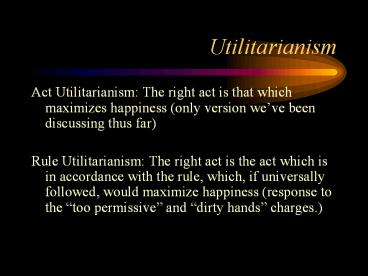Utilitarianism - PowerPoint PPT Presentation
Title:
Utilitarianism
Description:
Utilitarianism Act Utilitarianism: The right act is that which maximizes happiness (only version we ve been discussing thus far) Rule Utilitarianism: The right act ... – PowerPoint PPT presentation
Number of Views:202
Avg rating:3.0/5.0
Title: Utilitarianism
1
Utilitarianism
- Act Utilitarianism The right act is that which
maximizes happiness (only version weve been
discussing thus far) - Rule Utilitarianism The right act is the act
which is in accordance with the rule, which, if
universally followed, would maximize happiness
(response to the too permissive and dirty
hands charges.)
2
Utilitarianism
- Objection Rule utilitarianism collapses into
act utilitarianism. - Dont kill.
- Dont kill unless its in self-defense.
- Or as a part of a war whose outcome brings a
greater good. - Or if by so doing you an avert the deaths of one
or more innocents - OK, just dont kill unless it maximizes
happiness.
3
Deontology
- Immanuel Kant (1724-1804)
- Founder of Deontology
4
Deontology
- The right act is that which is in accordance with
the correct moral rule (GK. deon) or principle
(Kant calls these maxims) - Rejects hedonism
- Rejects consequentialism
- Different from Rule Utilitarianism--the rules of
deontology arent based on how much happiness
they would produce.
5
Deontology
- The only thing which is intrinsically good is a
good will. - A good will acts independently of the
consequences.
6
Deontology
- Other SUPPOSED intrinsic goods
- Happiness
- Intelligence
- Wit
- Freedom
- All of the above can be bad if not combined with
a good will.
7
Deontology
- Kant 2 types of motives
- Desire
- Reason
8
Deontology
- 3 motives for the shopkeepers honesty
- Direct inclination (desire)
- Indirect inclination (desire)
- Duty (reason)
9
Deontology
- DUTY means performing an action
- Out respect for the moral law
- From principle
- Because its right (or wrong)
- Mixed motives OK if duty is primary.
10
Deontology
- If duty and desire coincide, youre just lucky.
- Ex The duty to preserve your life
- Having good desires itself is not praiseworthy.
- The Compassionate Philanthropist
- Mr. Feziwig
11
Deontology
- Objection
- Kants view implies Mother Theresa is no better
than Scrooge! - Reply
- Both are motivated by desire
- Only the consequences differ
- Morality is independent of consequences
- People cant control what they desire
- They can control their rational choices
12
Deontology
- To act morally, you must appreciate the acts
moral qualities - Kant is a psychological egoist with regard to
desire - Moral action isnt motivated by desire, but by
reason - Morality is doing what you should do, whether you
want to or not
13
Deontology
- Imperative
- A general policy or principle of action
- A command we give ourselves
- 2 Kinds of Imperatives
- Hypothetical tell you how to achieve some
desire. - Categorical tells you what you must do
regardless of your desires.
14
Deontology
- Hypothetical Imperatives
- Practical guides unrelated to morality
- If you want X, do Y.
- If you want to lose weight, eat fewer calories
and exercise more. - If you want a safe yet profitable investment,
select a diversified mutual fund. - If you want to improve your grades, spend more
time studying.
15
Deontology
- Categorical Imperatives
- Absolute guides which comprise morality
- Dont do Y! Do X! or
- Dont kill innocent people!
- Dont cheat on your ethics test!
- Help those in need!
- Keep your promises!
16
Deontology
- The Categorical Imperative
- The principle which unites all individual
categorical imperatives - Can be formulated various ways
- Each formulation acts as a test
17
Deontology
- Maxim Principle of Action
- Universal Law Formulation of the CI
- Act only on a maxim you could will to be a
universal law. - Since morality is universal, any maxim must be
universalizable. - Ex The False Promise
- You cant imagine a world where everyone acts on
the maxim contradiction in concept
18
Deontology
- Other examples
- Suicide
- Murder
- Theft
- The above
- contain contradictions in concept
- Generate negative duties
19
Deontology
- Ex The Rugged Individualist
- You can imagine a world where no one ever helps
without a reward. - You cant consistently will such a world
contradiction in will - Contradictions in will generate positive duties.
- Ex The Unambitious Person
20
Deontology
- The Humanity Forumlation of the CI
- Act so as to treat humanity as an end in itself,
never merely as a means. - Its wrong to use people.
- People cant be treated like tools or inanimate
objects. - You must consider the goals and interests of
others.
21
Deontology
- Examples
- The Jealousy Plot
- The Tyrannical Boss
- Theft, murder
- Prostitution
- Objection Doesnt modern life require impersonal
interactions - Reply Maybe common courtesy is enough.

